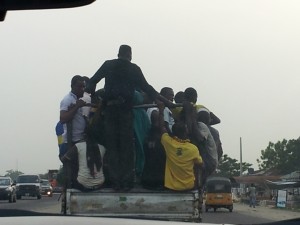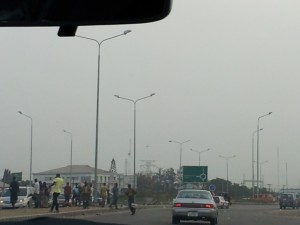
Driving in Lagos (and Nigeria) is quite something. The daily challenge on my way back home is to access the road: this requires crossing two lanes densely populated with cars, and then turn left. Once there, you have to watch for pedestrians who run across, vans loaded with people that overflow, and other cars aggressively trying to get in your way from the right side — don’t worry, I’m not the one driving! Our own driving style says something about our personality, doesn’t it? At the collective level, I see a parallelism between the driving and management styles in a country — at the risk of being stereotypical.
I first thought of this while in Bangalore, where I went with a group of IESE’s Global Exectuive MBA participants back in 2010. Traffic in India is slow but it keeps flowing — it’s only rare that you have to stop completely. And, from what we heard while there, that’s how things get done in India: you need consensus from all parties involved (managers, reps from various governmental layers, etc.), so decision-making is slow but still things keep flowing.
At the time, I thought this is in contrast to Spain: we press the accelerator and try to go through the amber signal at the very last second only to get stuck at the next traffic light a few meters down the road. This is how we do things often: we hurry at the last minute, and then things get stuck at the next step (I know I’m exaggerating: apologies to my country fellows!).

Drivers in Lagos are aggressive, and so is Nigerian management style. Nigerian managers are perceived as pushy by their counterparts from other African countries . One of the companies I’m working with these days opened a subsidiary in Ghana. They sent one of their highest-performing managers to head the operations there. After some time, he reported that potential customers were not returning phone calls and refused to meet with him. The reason? He was insisting in calling customers for follow up while they had said they would be the ones calling him back. And they perceived his insistence as an aggressive Nigerian style. It didn’t take too long to look for a Ghanaian as a replacement.
Any experiences about management style in other African countries?
By the way, I just saw some news at IESE‘s home site about General Electric’s plans for Africa. GE will be a great contributor to solve Africa’s power problems, as I mentioned in an earlier post.


Nice analogy! And for a moment I was quite impressed that you drive in Lagos.
Well… I guess that if I were to stay here for a bit longer I would indeed drive… but I think LBS doesn’t want to take any risks with me!
Christian, you have been in Kenya many times, do you see any similarity between driving and management styles there?
I don’t know Africa, but your analogies about India and Spain quite match some common issues of management (generalizing a lot, of course) in these countries. Good luck at Nigeria!
Thank you, Javier! Yes, these are generalizations but as you say these attitudes are not uncommon.